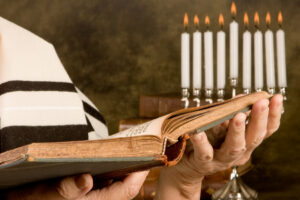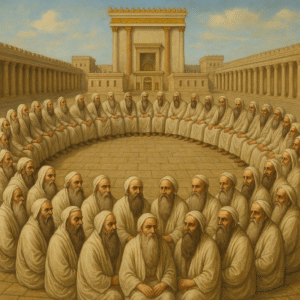A Day In The Life Of A Breslover Part III
People often ask, “What is it like to be a Breslover Chassid or a student of Rebbe Nachman?” While Rebbe Nachman strongly encouraged us to follow his advice, even if only sometimes or somewhat, Rabbi Yitzchok Breiter z”l did suggest a daily routine that we can all find to be very helpful.
[box type=”warning”] Rebbe Nachman’s Wisdom #273
A person has to be quick in serving God. A person has to be alert and ready every hour, every day to do as much as possible. Deeds are the main thing: study much, do many mitzvot, pray long and pour out one’s heart before God. One must do as much as possible in every way. Even so, don’t panic. You will find many kinds of devotion in the sacred literature and think, “When will I be able to fulfill even one of these devotions, let alone all of them?!” Don’t panic. One shouldn’t rush and try to grasp everything at once. He has to go slowly, step by step without getting into a tizzy and trying to do and accomplish everything immediately. If he is over hasty he will become totally confused. When there is fire, God forbid, people panic and rescue needless items.[/box]
13. The Works of Rebbe Nachman
One should study [something] from Rebbe Nachman’s work every day. By doing so he connects himself to [Rebbe Nachman’s] holy mind, infuses himself with the sacred strength to follow the ways of the tzaddik and brings the whole world to return to God.
14. Tehilim (Psalms)
Every day one should say at least ten psalms, because any ten psalms that are said effect great spiritual rectification.
One should say Psalms in the “first person,” namely, reading the events of his life into the words of the Psalms. This applies as well to all the expressions of praise and thanks in the Psalms; one ought to say them in thanks for all the kindness God has shown him throughout his life (Likutey Moharan II, Lesson #101).
15. Likutey Tefilot (Prayers of Reb Noson[1])
One should say some every day. One should also write some himself; one should pray that he put into practice the teachings of the tzaddik that he has studied in the latter’ss works. Such prayers are a great delight God.
16. Fixed Study Sessions
One has to schedule time for daily Torah study, and study cheerfully. One should not interrupt his study sessions for anything that is not urgent. The intention of one’s study should be that he thereby attain perfect faith.
From his studies, one should try to draw proper approaches for his service of God. One should develop original Torah ideas based on the concepts and teachings of Rebbe Nachman. In this way one will come genuinely close to God and draw others closer, as well (see Rebbe Nachman’s Wisdom #19; Likutey Moharan I, Lesson #62).
17. Eating
One needs to eat calmly and with proper manners. While eating, one should neither get angry nor talk unnecessarily; he should study Torah.
Grace after Meals should be said joyously. This brings about an illumination of Supernal Will, i.e., longing and desire to go in the way of God (Likutey Moharan I, Lesson #62 ).
Similarly, when satisfying or taking care of any material need, one should intend that it align with God’s Will, and result in a unification of the Holy Blessed One and His Shekhinah (ibid., II Lessons ##7, 77).
18. Earning a Living
One merits earning an honest living by strengthening his belief in God’s providence over every detail of Creation, and by knowing and believing that livelihood comes to not because of a natural chain of events, but only through God’s Will.
God could provide a person’s livelihood without using intermediary steps/causes, if He wanted. God has a person work for a living via natural means in order to provide a test: [a] can a person withstand the trials he encounters in dealing with the means he engages; and [b] can he stay firm in the belief that livelihood does not depend on the means but only on God’s Will alone (Likutey Moharan I, Lesson #62).
19. Tzedakah (Charity)
One should tithe any sort of income he receives, regardless of how it came to him [e.g., work, profit or gift], and give a portion of it to further any cause relating to Rebbe Nachman, such as [1] supporting his descendants or followers who engage in sincere service of God; [2] printing the Rebbe’s works so that they can be sold inexpensively to Jews everywhere; [3] supporting Breslover batei midrash (study halls).
Initially, it is good to contribute a minimum of two per-cent (2%) of one’s income, with the eventual goal of giving a tenth (10%) of the principal (See Likutey Moharan I, 4:8 and Parparaot LeChokhmah, ad. Loc.).
20. Printing/Distributing Rebbe Nachman’s Works and Spreading his Teachings
This is an essential and fundamental activity. Through this, all Jews can be brought to the true path [of life], which is our ultimate goal and that of all the [spiritual] worlds. Therefore, all followers of the Tzaddik must consider this activity kodesh kadashim ( a “holy of holies”) and selflessly devote all their energies to it. They should constantly seek ways of expanding these activities and spreading the Rebbe’s teachings further and further, in order to inspire every Jewish soul to return to her Father in Heaven (See Kochavey Or: The Followers of Rebbe Nachman #47).
[1] The prayers Reb Noson composed based on the lessons of Likutey Moharan are known as Likutey Tefilot.
- 0 comment





















